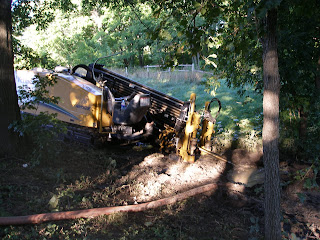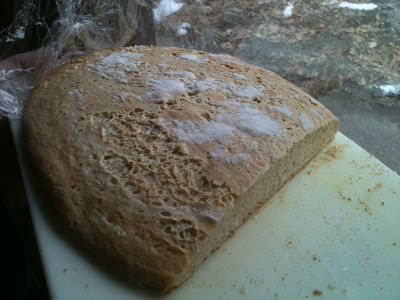What a great sight.
I can close my eyes and envision a long grassy hill. It stretches from my garage along the driveway to the street. The hot sun bakes the dry grass and rain runs off it in sheets washing away the gravel. I mow it and I mow it. Its mostly crab grass.
Now when I open my eyes I see a orchard of 45 fruiting trees and shrubs. An edible forest garden that needs no fertilizer, no soil amendments and especially, no added water. The chicory hosts a squadron of Finches. Bees, Butterflies and beneficial insects dance from plant to plant above the shaded under story and banks of alyssum and bachelor buttons. Not a drop of rain leaves the hill as it stores the water in huge lenses of moisture beneath the swales. Lying under ice, spring thaw fills the frozen basins with melt from winter drifts. The drive way dries out quickly in the rising sun.
Nature follows water. Wherever we can store it in the soil the soil will increase in nutrients, organic matter and soil organisms. We are actually inoculating the land with water, making it more drought tolerant and in a sense creating an invitation to nature. The momentum builds with each new rain as life in the berm is refreshed and plants expand their roots to new depths and distance. The plants protect the new soil, hold it tenderly in a mesh of ever expanding and interwoven roots and fungi.
This is our berm and swale orchard. We harvest the rain and delay it a while before it leaves for the wetland, the lake and aquifer. It cleans the air with thousands of supporting plants and build the soil and buffer the weather and precipitation.
In the Minnesota winter we harvest the stored rain from shelves of mason jars. Summer storms turn to preserves, soups and tea. The root cellar is filled with vegetables and fruit. The sunny days and summer rain stays with us, long into the winter as the swales once again fill with ice.
Soil and plants have a precarious relationship with water. At once water can erode and destroy the very soil structure plants need for survival, but it also provides the only avenue for nutrients and minerals in plant biology. We too have a relationship with water. Too much and it drowns, floods and destroys. Our tendency is to remove it from our property as soon as it arrives when we could benefit from storing it on-site. We can use it to buffer the dry days while cleaning the air. It cools the air around our homes and attracts the beneficial insects. By creating wet spaces nature has a place to deliver us fruit, beauty and occasional humming birds.
Water is like our favorite rich uncle, why would we want him to leave?


Comments